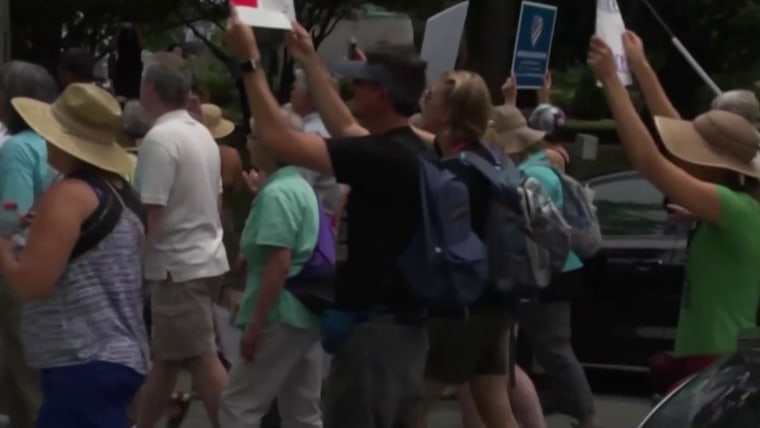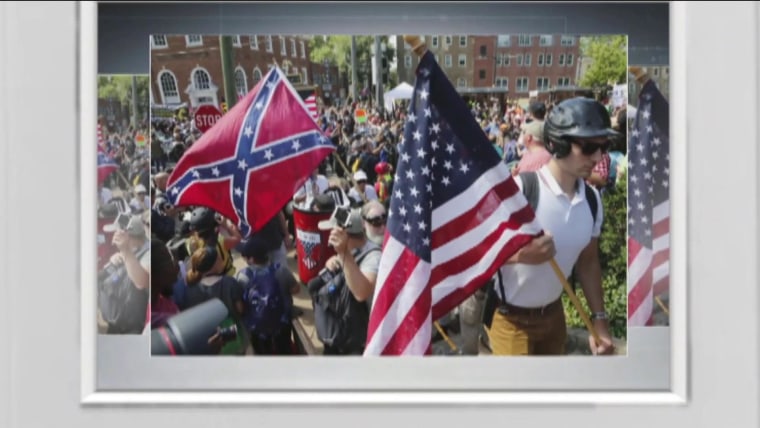Before hundreds of neo-Nazis descended on Charlottesville, Virginia, for the "Unite the Right" rally in 2017, they gathered in person and on Discord, meticulously planning the deadly event, which has since been seared into American history.
On Discord, attendees coordinated rides, planned chants, discussed Virginia laws and talked about what gear to take. Leaders and planners of the rally answered questions, laid out its philosophy and told participants to be ready to die for the cause.
"We are angry. ... There is a atavistic rage in us, deep in us, that is ready to boil over. There is a craving to return to an age of violence. We want a war," Andrew Anglin, the founder of the neo-Nazi website Daily Stormer, wrote in anticipation of the rally.
As it got closer, the rally took on new meaning. Organizers like Anglin wrote that it was no longer just about fighting to stop the removal of the city's Robert E. Lee statue. Now, it was "something much bigger": "a rallying point and battle cry for the rising Alt-Right movement."
The chats, along with a mass of additional evidence, show that the violence on that August weekend was premeditated, attorneys for those injured and traumatized by the rally argue. On Monday, more than four years after the rally, the argument will be made in federal court, as attorneys for nine people injured on Aug. 11 and 12, 2017, seek financial compensation from about two dozen organizers in a massive civil lawsuit.
The case, the first major civil suit to be tried under the so-called Ku Klux Klan Act in years, could provide a model to hold those who incite right-wing extremist violence accountable, possibly changing the common understanding of who bears responsibility for violence.
The plaintiffs are suing organizers of the rally under the Enforcement Act of 1871 — often called the Ku Klux Klan Act — claiming that the defendants violated the act in a conspiracy to harm people of color and Jewish people. The act allows those whose rights have intentionally been violated to bring civil suits against the perpetrators. Among the evidence at the core of their argument are leaked conversations from the organizers' Discord, which they will argue proves that the event was premeditated and therefore illegal.
"There are certain cases where the best strategy is truly just to tell the jury what happened. The facts in essence speak for themselves," said Karen Dunn, one of the lead attorneys for the plaintiffs. "Many people think they know what happened — they saw video of the torch march and video of the car attack. There was so much going on beneath the surface, and we have spent the past couple of years collecting a mountain of evidence."
The plaintiffs, all of them Charlottesville residents, were categorized in three ways by the court in 2018: The first category is counterprotesters who were injured at the evening rally on Aug. 11 where Unite the Right attendees carried tiki torches and shouted, among other things, "Jews will not replace us"; the second is those who were injured when James Fields drove his car into a crowd of counterprotesters on Aug. 12, killing Heather Heyer; the third is a minister who was assaulted and a Jewish woman who was subjected to antisemitic slurs as they were counterprotesting.
Amy Spitalnick, the executive director of Integrity First for America, the nonprofit organization backing the suit, said the goal is to find justice for the victims and bankrupt the defendants.
"The violence that happened four years ago was not an accident," Spitalnick said. If the plaintiffs succeed, she said, it could "provide a model for how you can hold extremists accountable" and show others that stoking extremist violence will create "very serious financial, legal and operational consequences."
The defendants' argument is simple: The organizers and the attendees were exercising their rights to free speech and assembly guaranteed by the First Amendment — whether you liked what they were saying or not is irrelevant.
The defendants filed a motion to dismiss the suit, which U.S. District Judge Norman K. Moon rejected in 2018.
"While the Court acknowledges the weighty First Amendment interests implicated by the 'Unite the Right' events, Plaintiffs here have plausibly alleged conduct that lies 'close to the core of the coverage intended by Congress' when it passed the Ku Klux Klan Act to address violence against racial minorities," Moon wrote. (The court did dismiss one defendant.)
The First Amendment protected their right to protest the renaming of the park, "even if motivated by racist ideology," but it does not protect against violence, Moon said.
Two of the defendants, Jason Kessler and Richard Spencer, gained significant notoriety during and after the protests.
Kessler, a white nationalist who organized the rally, is a former member of the Proud Boys. He applied for the permit to host the Aug. 12 rally.
Spencer, also a white nationalist, planned the Aug. 11 rally. He has said he is unable to afford a lawyer for the trial and is representing himself.
Asked by phone Tuesday whether he was available for comment, Elmer Woodard, who is representing many of the defendants, said, "No." Woodard responded "no" again when he was asked to specify which defendants he was representing. Other attorneys for the defendants could not be reached for comment.
The trial begins Monday in the Western District of Virginia. Moon is handling jury selection. Opening arguments are expected to begin soon after.
The case has been a long time coming. The suit was first filed in October 2017. Moon rejected a defense motion to dismiss the case in 2018, but he did dismiss one plaintiff. Since then, defendants have been sanctioned and found in civil contempt for failing to cooperate. The coronavirus pandemic delayed the trial further.
Seven defendants have entered default judgments: Anglin, Nationalist Front, Moonbase Holdings LLC, East Coast Knights of the Ku Klux Klan, Fraternal Order of Alt-Knights, Augustus Invictus and Loyal White Knights of the KKK.
The plaintiff's attorneys said their main objective is to find justice for the victims. But should they succeed, the impacts could reach far beyond monetary payments.
"This is the victims fighting back through the law," said Brian Levin, the director of the Center for the Study of Hate and Extremism at California State University, San Bernardino.
Because of the First Amendment, "we have to tolerate bigotry in the marketplace of ideas," he said. "But when that bigotry turns into conspiratorial violence, there is redress."
The plaintiffs' counsel says people will look to the case to model ways to find justice for victims of racially motivated violence. Since the suit was filed four years ago, many other civil cases have been initiated under the KKK Act.
"I didn't really realize there would be a veritable renaissance of KKK Act litigation in the country," said Robbie Kaplan, the other lead attorney for the plaintiffs.
"The ultimate goal is not only to get verdicts and judgments for our clients," Kaplan said, "but to create the pressure that is required so that nothing like Charlottesville or even like Jan. 6 ever happens in our country again."
"right" - Google News
October 22, 2021 at 03:31PM
https://ift.tt/3pn9qJj
Charlottesville 'Unite the Right' trial set to begin four years after rally - NBC News
"right" - Google News
https://ift.tt/32Okh02
Bagikan Berita Ini
















0 Response to "Charlottesville 'Unite the Right' trial set to begin four years after rally - NBC News"
Post a Comment